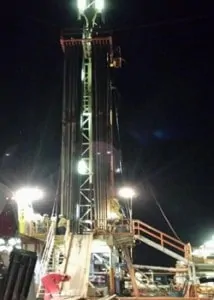

Deep well injection and carbon sequestration (also carbon capture and underground storage or CCUS) are services that permanently isolate fluids and gases in deep geologic formations to ensure these materials stay there and don’t impact useable resources or the environment. It encompasses the practice of geologic consulting, reservoir engineering, and deep drilling to plan, permit and execute projects that support environmental objectives. Our services include compliance monitoring, testing, reporting, and optimization of the geologic sequestration asset.
SCS Engineers has provided wastewater/fluid treatment, isolation, storage, and deep well disposal solutions for over 35 years. During this time, the treatment and disposal of liquid wastes have become increasingly challenging. This is due in part to regulations designed to protect surface and groundwater. Deep well injection is a safe and viable solution when planned and permitted correctly.
Deep well injection is the process of safely storing or disposing of liquids deep underground. It involves drilling beneath drinking water aquifers (1,500 to >3,000 feet deep) to trap the liquid waste under multiple impermeable layers of rock. It requires favorable geology, so it is not suitable for all locations.
However, where the geology permits, deep well injection has considerable advantages, such as:
SCS Engineers has extensive experience with a broad range of successful deep well injection projects, including clients working in these business sectors and industries:

Many communities use industrial waste disposal wells for stormwater, large-capacity septic systems, and agricultural drainage. They are regulated and are not allowed to endanger underground sources of drinking water. SCS’s UIC services involve a wide array of underground injection well classifications and include those for carbon sequestration or geologic sequestration strategic to accomplishing CO2 reduction goals in the U.S. The EPA classifies the wells for municipal and industrial use as follows:
SCS can provide a turnkey solution or assist at any stage of a deep well injection project, including: